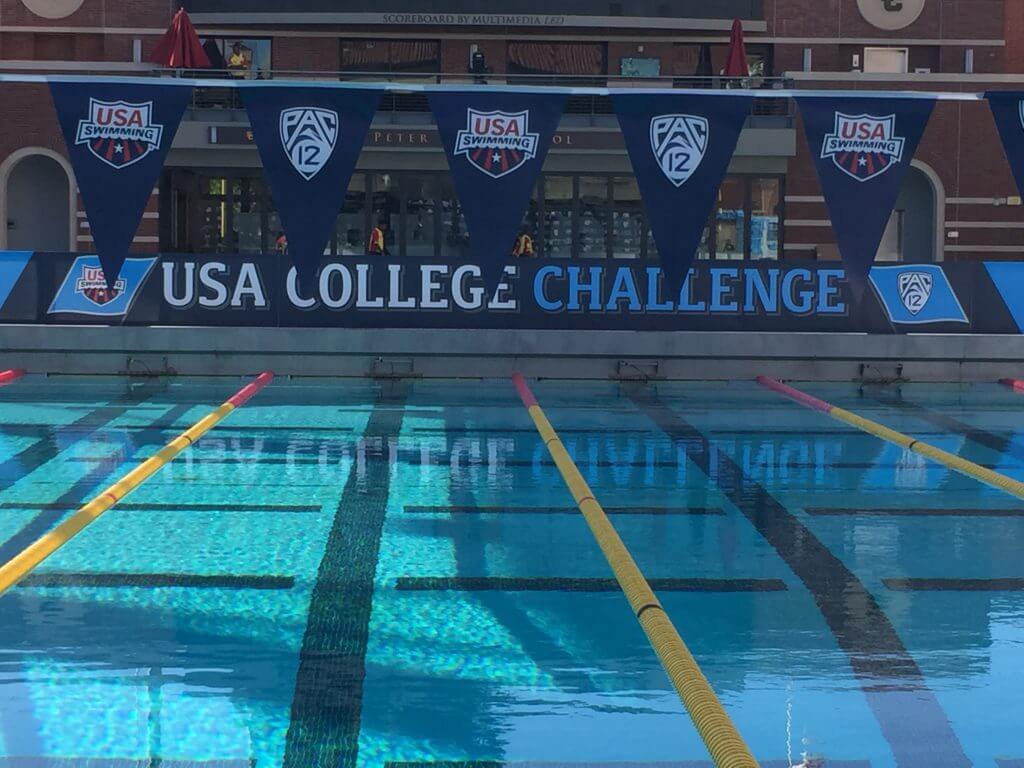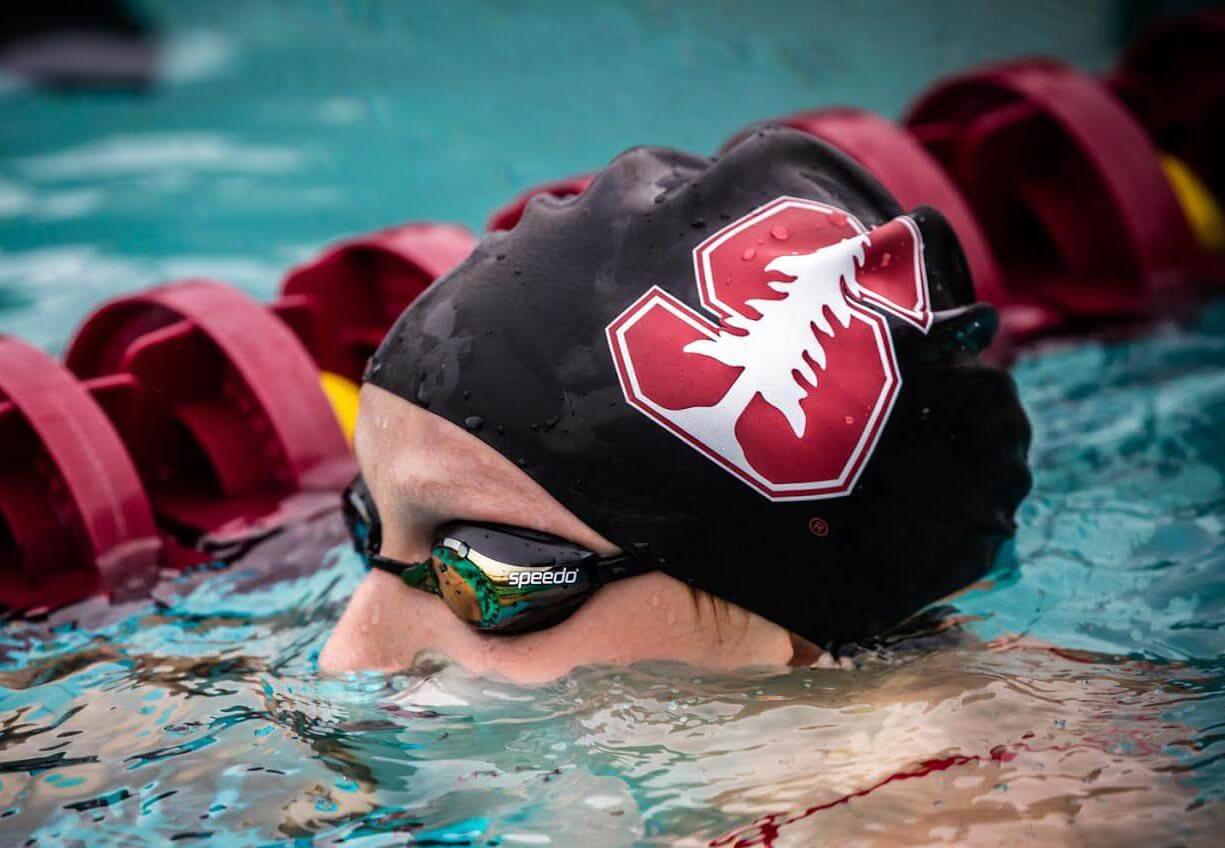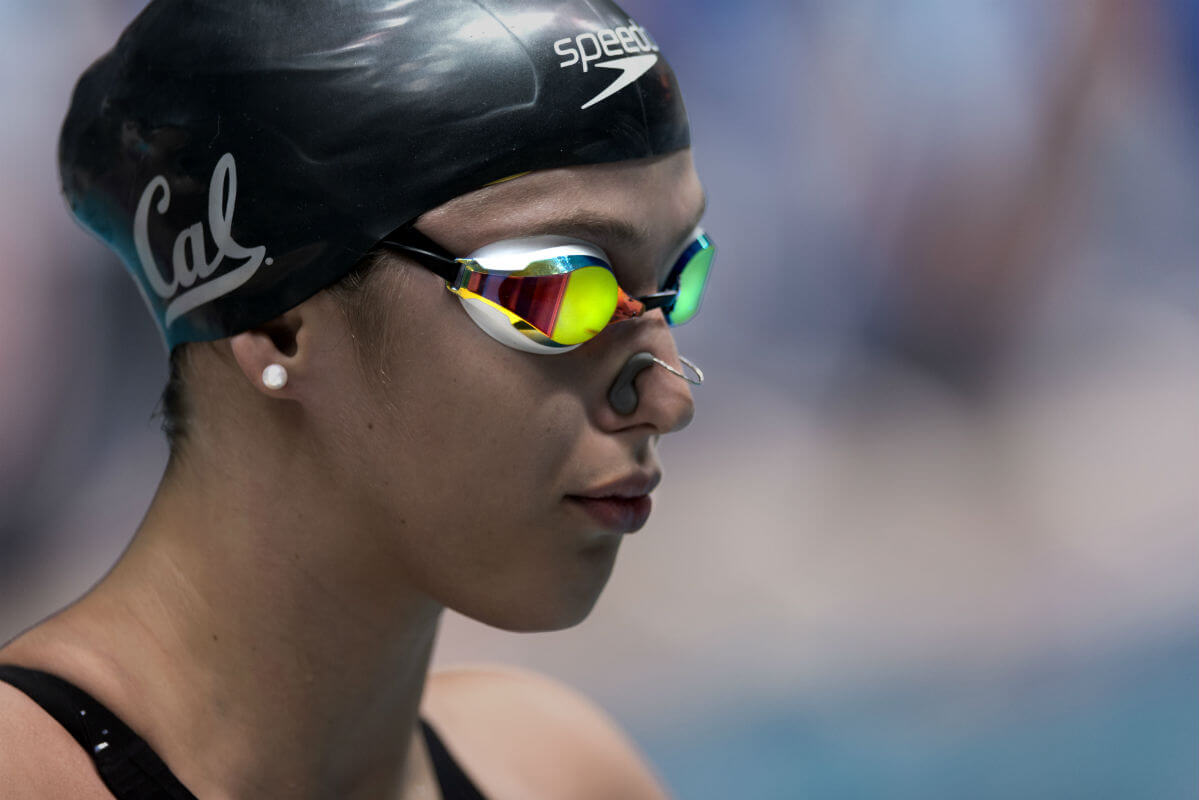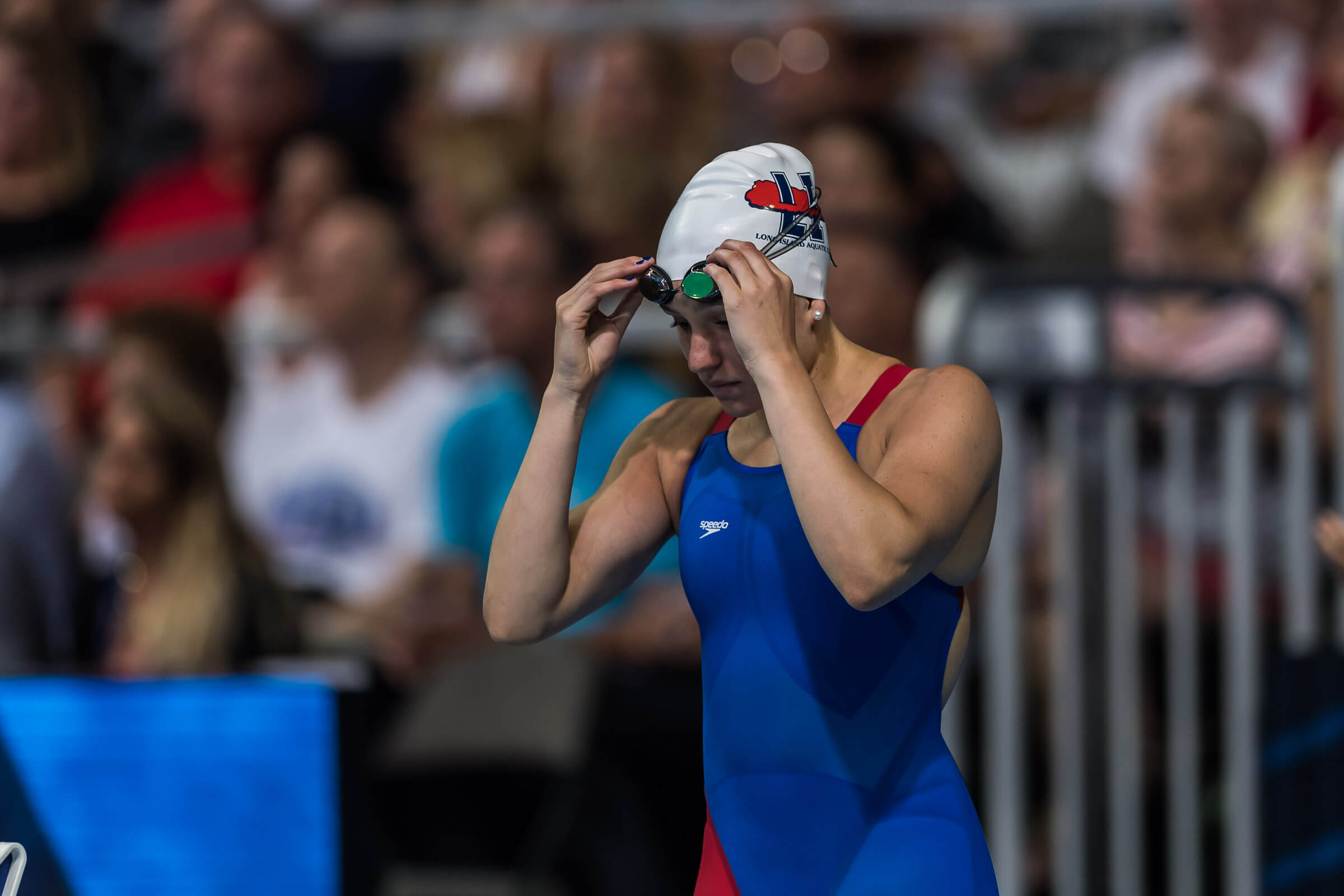At USA College Challenge, the Pac-12 Team Has Unified and Rallied

Morning Splash by David Rieder.
In the first edition of the USA College Challenge in 2016, the collegiate all-stars competing against a watered-down version of the U.S. National team had no chance at a victory. This year, the team representing the Pac-12 showed up in Los Angeles knowing they had a shot.
And on day one at the Uytengsu Aquatic Center, the college students held their ground. After the U.S. team won both the women’s and men’s 400 medley relays to open the meet, the Pac-12 team slowly chipped away at that early advantage, and going into the final events of the night, the score was tied at 131. Then, the collegians managed to win both the women’s and men’s 800 free relays, opening up a 155-to-141 lead.
The U.S. team made a run on day two, sweeping the top three spots in both the women’s and men’s 100 breast events, but that team could not catch the Pac-12. The final score: Pac-12 326.5, Team USA 286.5.
The first catalyst for the Pac-12 was a name all too familiar to swimming fans—and, frankly, even casual sports fans: Katie Ledecky.
Time after time over the past five years, Ledecky has stolen the show for the U.S. teams at major international competitions. It’s four gold medals from Rio that are most memorable, and one year earlier, she had been responsible for five of the eight American gold medals at the FINA World Championships in Kazan.

Katie Ledecky — Photo Courtesy: Matt Rubel of Rubel Photography
In her freshman year at Stanford, Ledecky was at the center of Stanford’s first NCAA team title in two decades. And now, as a member of the Cardinal, she’s competing this weekend as a Pac-12 all-star—with the goal of taking down Team USA. Sure, it’s not a meet with the end-all significance of the World Championships or Olympics, but that doesn’t make her competitive situation any less… eerie.
“It’s not every day I’m trying to beat the USA,” she said in a Pac-12 network post-race interview.
In her lone individual race of the first evening of the College Challenge, Ledecky dominated the 500 free. It was a familiar refrain for those who followed her first year with the Cardinal, when she thrice lowered the American record in the event.
As the sun set Saturday evening in Los Angeles, Ledecky finished in 4:28.75, the 12th-fastest time in history. She, of course, is responsible for all 11 efforts that are quicker.
Less than two hours later, Ledecky anchored the Pac-12 women’s 800 free relay in 1:42.41, the fastest split in the field. Handed a lead of a tenth of a second, Ledecky pushed the margin to more than two seconds.
On Sunday, Ledecky added wins in the 1000 (9:11.68) and 200 free (1:41.60), and she provided the third leg of the meet-clinching Pac-12 women’s 400 free relay.
You can be sure that the powers-that-be at USA Swimming are thoroughly pleased that the College Challenge is just an exhibition and that Ledecky has no plans to ever compete against her home country again.

Kathleen Baker — Photo Courtesy: Chuckarelei / Pac-12
Among the other conference team winners: Kathleen Baker in the 100 and 200 back and Ella Eastin in the 200 fly and 400 IM. The two ended up tying for first in the 200 IM. Both are among the best in the world in their events, and both are proud Pac-12 student-athletes.
But the aforementioned superstars only could only give the conference team a chance at competing with the Americans. The Pac-12 swimmers needed a spark, and they got two of them, back-to-back, from a quartet of swimmers who felt right at home at USC.
The momentum shift came Saturday in the men’s 200 back. Baker had won the women’s version of the event, in no major surprise, but Olympic gold medalist Ryan Murphy and World Champs bronze medalist Jacob Pebley loomed. A Team USA 1-2 was the obvious, predictable outcome.
Until, well, it wasn’t. Patrick Mulcare won in 1:40.44, and Robert Glinta came in second in 1:40.50. The two USC Trojans had finished 1-2. Murphy made a late charge, but he had to settle for third, 0.12 behind Glinta.
One race later, Trojans Riley Scott and Maggie Aroesty stormed to the front of the pack in the women’s 200 breast, only for Olympian Molly Hannis to make a break for home on the last 50. Hannis got passed Scott, but Aroesty had enough to hang on for the win. Scott finished just behind in third.
Aroesty, a freshman from Long Island, was stunned. She had touched in 2:06.88, two seconds quicker than her previous lifetime best, set in a dual meet just a week earlier. An ecstatic Scott raced over the lane line and embraced her freshman teammate.
Aroesty’s time that would have been quick enough to make last year’s championship final at the NCAA championships, and it was nine tenths quicker than the previous Uytengsu Aquatic Center record, a mark which had been set by 2008 and 2012 Olympic gold medalist Rebecca Soni.

Maggie Aroesty — Photo Courtesy: Peter H. Bick
“It was so special. I was totally shocked by my time,” Aroesty said. “I think being home really calmed my nerves a little. I get really nervous at big meets, and I think seeing this environment and seeing some of my teammates in the stands and being able to race in a pool that I’m comfortable in was part of my race tonight.”
The USC Trojans built some momentum for themselves through the performances from Mulcare and Glinta, from Aroesty and Scott, and it didn’t take long for the entire Pac-12 team to get behind their new—but temporary—teammates.
After all, the swimmers were representing their conference, not an entity they never had swum for before. College teams inspire loyalty, as do national teams. But the entire concept of the College Challenge asks swimmers to unify under a banner that normally divides them as rivals.
“It was definitely a little weird at first,” Aroesty said. “I think initially people were swimming for themselves, maybe their schools. I think as the night went on, Team USA was leading in the beginning, and I think we kind of rallied together and wanted to win as the Pac-12.”
The Pac-12 roster was always talented—the women’s team undoubtedly superior on-paper to the United States—but winning a dual meet takes a team. And the composition of all-star teams can be tricky. It’s worth noting, after all, that talented European all-star teams never could top the United States in three attempts at the Duel in the Pool.
But this Pac-12 roster seems to have found some chemistry. Before the men’s 800 free relay, a “Let’s go Pac-12!” cheer broke out on pool deck, prior to the team’s win over the Americans.
And now, one year after the Americans crushed a team of Big Ten all-stars 349 to 247, this year’s College Challenge was competitive, with the college team scoring a minor upset against the National Team. The outcome was often in doubt, and in a dual meet format, what more could anyone want?



